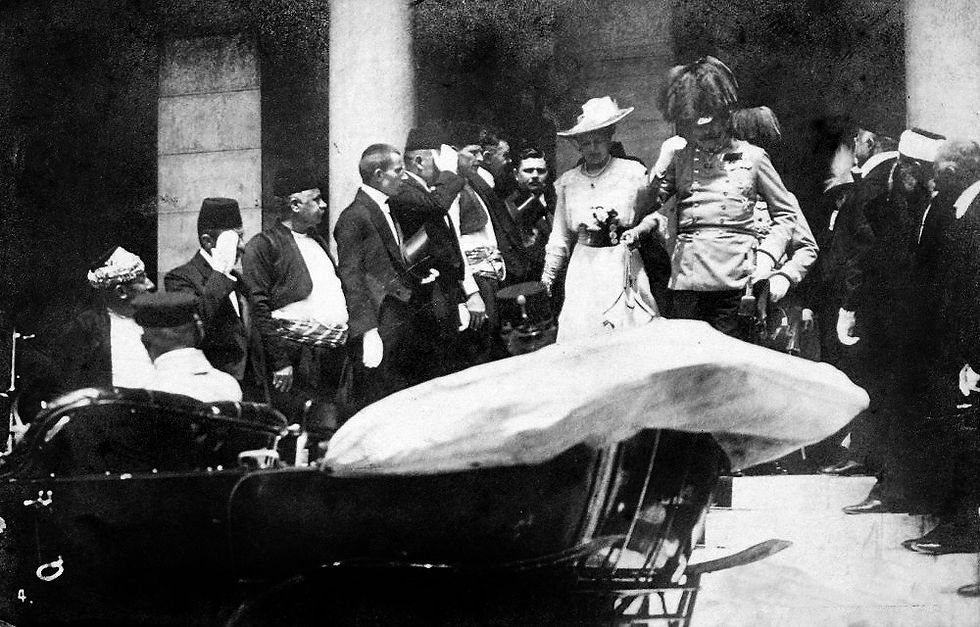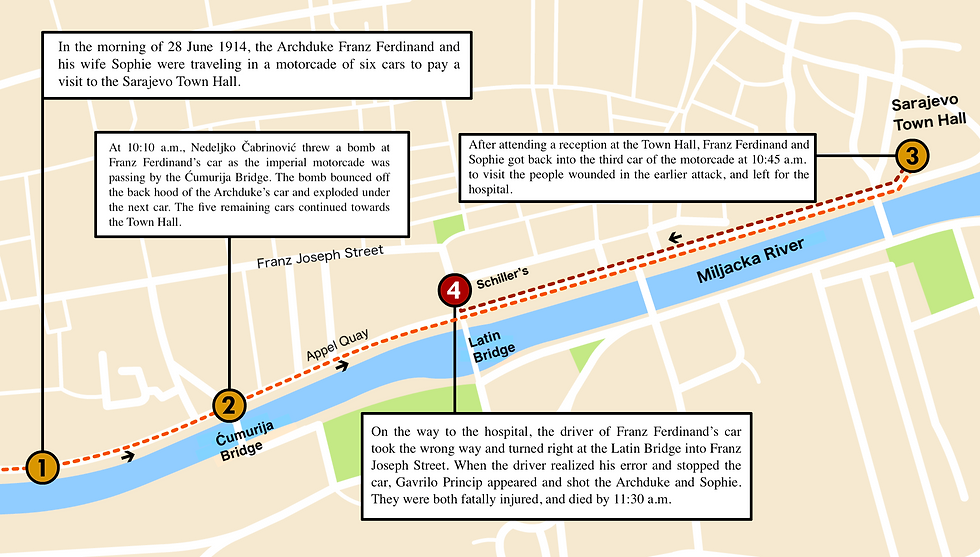Global conflicts mark our world for generations. The first world war’s legacy continues today, with conflicts such as those in the Middle East and in the Balkans resulting from its aftermath. But the horrific scenes of violence and everlasting impacts always overshadow what may be the most important. The cause of war. It's an established fact that the first world war changed our world forever. But one debate that continues on until this day is its inevitability. Whether the first world war was inevitable or not is a question many do not agree on. The main event that ignites this controversy is the assassination of Archduke Franz Ferdinand of Austria-Hungary and his role in the start of the Great War.
Austria-Hungary was a powerhouse. The empire spanned across central Europe and continued to expand into the twentieth century. As the empire expanded, it became home to more ethnic minorities who weren’t thrilled to be ruled by the Habsburg-Lorraine royal house. Bosnia was annexed by the empire in 1908. The new territory lay on the ruins of a Serbian dream of a pan-slavic state. In June 1914, Archduke Franz Ferdinand, the heir to the Austrian-Hungarian throne, traveled to Sarajevo with his wife to inspect his imperial armed forces. He wanted to put on a show of force for the Serbians. Although there were terrorism threats, many security precautions were not taken. The archduke also visited on a historically significant day for the Serbians, St. Vitus’ day, adding salt to the Serbian wound. A Serbian ultra-nationalist, the Black Hand, planned an attack along Ferdinand’s motorcade, equipped with explosives, revolvers and cyanide (in case they were caught). The assassins threw explosives at Ferdinand’s motorcade, but missed him and instead injured police officers behind them. At this point, most would ask, why didn’t he call off the rest of the trip? Ferdinand was known to be irritable and made the ill-advised decision to return to the streets of Sarajevo. After remaining in the city, Ferdinand and his wife made their way to the hospital to visit those injured in hospital. However, the czech driver, who didn’t understand the directions, took a wrong turn. This fatal mistake led to the death of Ferdinand, as they coincidentally ended up on the same street as one of the Black Hand assassins, Gavrilo Princip, who shot the duke and his wife point blank. Angered by the assassination of their future heir, and the killer being a Serbian nationalist, Austria-Hungary declared war on Serbia. Many more declarations of war were to follow, resulting in the first world war.


While this one event did lead to the first declaration of war, there were other factors that contributed to WWI. One was the complex web of alliances in Europe that had developed. Austria-Hungary’s declaration of war on Serbia involved Russia (allied with Serbia) and Germany (allied with Austria-Hungary). This snowballed with France joining as it was a russian ally, and the UK then joining as an ally of France. In essence, this web of alliances allowed this small conflict to grow exponentially.
Other factors include growing militarism and nationalism. Countries such as the UK and Germany increased military spending dramatically in the years leading up to WWI. The naval arms race between Britain and Germany led to the development of new technology used during the war, such as the Royal Navy dreadnoughts. Nationalism was also on the rise in Europe. Many smaller ethnicities in multi-ethnic states sought self-determination, such as the Bosnians in Austria-Hungary. Additionally, many other smaller ethnic states such as Serbia feared the expansion of larger more powerful states. The issue with nationalism is it warrants other countries to expand their influence, as they see their people as ‘superior’ to others.
All of these factors tie into each other and have a complex relationship. For instance, nationalism can lead to militarism. An example of this is the arms race between the major powers Britain and Germany leading up to the first World War. Many also credit the rise in imperialism as an important factor, as major powers battled for land around the world, specifically in Africa. This competition can further stoke nationalism and militarism as countries seek expansion.
The main takeaway here is that there was no one factor that caused the first world war. And this is true for any war. Rather, it is more often that not a complex and messy web of factors that ignite such a large conflict on such a global scale. Even over a hundred year since the end of the conflict, experts continue to debate and disagree on its cause. While we cannot boil down this conflict to one reason, we can honor those who fought, and appreciate its tales. Such as the accidental assassination of Archduke Franz Ferdinand, and its fascinating story.
References
“Arms Race Prior to 1914, Armament Policy.” New Articles RSS, 1914 1918 Online, https://encyclopedia.1914-1918-online.net/article/arms_race_prior_to_1914_armament_policy.
“Black Hand.” Encyclopædia Britannica, Encyclopædia Britannica, Inc., https://www.britannica.com/topic/Black-Hand-secret-Serbian-society.
Mutschlechner, Martin. “The Dual Monarchy: Two States in a Single Empire.” Der Erste Weltkrieg, 17 Aug. 2014, https://ww1.habsburger.net/en/chapters/dual-monarchy-two-states-single-empire#
Pruitt, Sarah. “How a Wrong Turn Started World War I.” History.com, A&E Television Networks, 17 July 2018, https://www.history.com/news/how-a-wrong-turn-started-world-war-i.
Snow, Dan. “Was World War One Inevitable without Franz Ferdinand's Assassination?” History Hit, History Hit, 28 June 2018, https://www.historyhit.com/was-world-war-one
Image Sources
By Walter Tausch - Europeana 1914-1918, CC BY-SA 3.0, https://commons.wikimedia.org/w/index.php?curid=26951169
By Originally created by User:Hmaglione10 : Modified by User:麩 - File:Atentado_de_Sarajevo.png, CC BY-SA 4.0, https://commons.wikimedia.org/w/index.php?curid=79086539

Comments